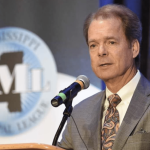An independent firm tasked with assessing the scope of service provided by the Holly Springs Utility Department has validated complaints from disgruntled ratepayers who have maintained that they, for years, have endured frequent power outages with no clear solutions offered by those in authority.
Last August, the Mississippi Public Service Commission tabbed Silverpoint Consulting to investigate the adequacy of electric, gas, water, and sewer services by the Holly Springs Utility Department. The utility provider, which encompasses its home city of Holly Springs, along with parts of Marshall, Benton, and Lafayette counties in Mississippi and Hardeman and Fayette counties in Tennessee, is solely managed by the city of Holly Springs, despite 80% of its customers living outside city limits.
Silverpoint Consulting was initially met with resistance from HSUD leadership when it began its assessment into the utility, sources told SuperTalk Mississippi News, but after work was done behind the scenes to garner compliance, the firm was ultimately able to gather the necessary data to compile a thorough report.
In its finalized 75-page report, Silverpoint found that several years of mismanagement caused the system to spiral into a degenerative state. The firm’s investigation of HSUD encompassed a broad range of areas, including system operations, vegetation management and other preventative maintenance, emergency preparedness and response, system planning and analysis, and support functions such as metering and billing.
Although Silverpoint indicated that the city of Holly Springs’ limited financial resources were the catalyst behind many of HSUD’s struggles, the firm also found that chronic maladministration played a key role in the system being plagued by obstacles that became increasingly difficult to navigate.
Blatant issues such as vegetation overgrowth along power lines, substations that have been near-abandoned to the point that the entire system’s reliability is in peril, and flawed emergency response practices — all of which could put area residents in imminent danger — have been the product of a lack of leadership within HSUD, per Silverpoint.
“The shortcomings we identified during our review are consistent with the kind of reliability, service quality, and billing-related issues raised in customer complaints to the [Mississippi Public Service Commission]. There were some recurring themes — inadequate management or technical/engineering expertise, reactive versus proactive maintenance practices, insufficient planning and analysis, and questionable choices that appear to have been influenced by the City’s lack of financial resources,” a portion of the report reads.
“The current death spiral of the utility’s AMI metering system, for example, was brought on by a combination of poor decision-making, negligent maintenance, and management’s inability to respond to operational challenges.”
Northern District Public Service Commissioner Chris Brown, after receiving numerous complaints, sought answers for the perpetual power outages residents faced and the apparent unwillingness by HSUD to properly serve its customers. After running into numerous roadblocks in receiving information from the utility provider, Brown successfully petitioned the state legislature to pass Senate Bill 2453 during the 2024 session. The bill expanded the commission’s authority over public utilities.
Brown and his commission colleagues utilized their newly minted power to have Silverpoint look into complaints levied against HSUD. While at first, Holly Springs officials were able to skirt subpoenas and a show cause hearing facilitated by the commission, a change in leadership within city hall proved effective in moving the proverbial ball in the right direction.
During April’s municipal primaries, Charles Terry, a former Marshall County supervisor, defeated incumbent Democratic Mayor Sharon Gipson. Terry went on to win the mayor’s seat, and, according to Brown, has been much more cooperative with independent investigators and regulators in their pursuit to get to the root of HSUD’s problems.
The new mayor’s compliance has been a breath of fresh air for the commission and the Tennessee Valley Authority, the nation’s largest public utility and the entity that sells wholesale power to HSUD, but it has not changed how officials will plan to move forward now that Silverpoint has concluded its investigation.
“The Silverpoint report lays bare just how dire the situation is at Holly Springs Utility District. This crisis didn’t happen overnight — it’s the result of decades of neglect and mismanagement,” Brown said. “The system is in a severe state of disrepair, and turning it around will require an extraordinary, coordinated effort. TVA, along with federal, state, and local partners, must come together to confront this crisis and ensure reliable service for the people of the HSUD service area.”
As for the future of HSUD, Silverpoint highlighted that one option afforded by SB 2453 gives the commission the power to seek a court-ordered receivership over the public utility. However, the independent firm contended that it “may be quite difficult to find an entity willing to act as receiver for the HSUD electric utility” to remedy ongoing issues.
Instead, the firm advised regulators to temporarily put receivership talks on hold and sponsor a “feasibility study” to determine if an alternative solution could be possible.
Potential scenarios for evaluation included selling HSUD to another municipal or cooperative utility, converting HSUD into a cooperative structure — one that is owned and governed by its customers — or for the government to acquire HSUD through eminent domain or condemnation. Regardless of the path leaders choose to trek, Silverpoint acknowledged that a large sum of money and highly skilled management will be required to reverse years of malpractice.
The commission plans to announce its next steps at an Aug. 5 docket meeting in downtown Jackson.








